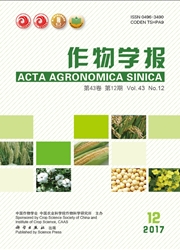

 中文摘要:
中文摘要:
对新型饲草玉米不同生长阶段的生长速度、物质积累与分配进行了研究,并对其营养价值进行评定。结果表明,新型饲草玉米生长动态符合Logistic模型,经历了慢-快-慢-快-慢的变化过程;从分蘖期至吐丝期,生物量和茎/叶比值增加,但适口性和营养价值降低,抽雄期后降低更为迅速;其中总能(GE)、消化能(DE)、代谢能(ME)和可消化养分总量(YON)在孕穗期或抽雄始期最高;抽雄始期鲜草产量和干物质产量分别达101.4thm^-2和18.35thm^-2,粗蛋自(CP)、粗纤维(CF)、粗脂肪(EE)、粗灰分(CA)和无氮浸出物(NFE)含量分别为14.2%、24.3%、3.9%、6.3%和51.3%。产草量和营养价值均较高。综合分析表明,为同时获得较高物质产量和营养价值,饲草玉米在抽雄始期收割最佳。
 英文摘要:
英文摘要:
Forage maize ( Zea mays × Z. perennis) is a new type of perennial forage grass bred by maize-perennial teosinte substitution line (2n = 20) and Z. perennis (2n = 40). It can be harvested for silage or green feed several times in one growth period, and has high nutritive value, regenerative ability, and environmental adaptation. To understand the growth regularity and confirm the best harvest time of forage maize, its growth rate, fresh and dry matter accumulation and distribution during different stages in a field experiment were investgated, and evaluated its nutient values. The results indicated that the dynamic growth of forage maize fits Logistic model, and the growth rate was slow from the 30^th to 50^th day after sowing, fast from the51^st to70^th day (4.4cm d^-1), slow from the 71^st to 90^th day, fast from the 91st to 110th day, and slow after 111^st day (productive stage). Biomass and the ratio of stem to leaf of forage maize increased while palatability and nutritive value declined from filleting to silking stages. After tasseling stage, the nutrient value declined faster. Gross energy (GE), digestible energy (DE), metabolizable energy (ME), and total digestible nutrient (TDN) were the highest at booting or initial tasseling stage, which were 18.5 MJ kg^-1, 12.2 MJ kg^-1, 10.0 MJ kg^-1, and 0.66 kg, respectively. At initial tasseling stage, the fresh and dry matter yields were 101.4 t ha^- 1 and 18.35 t ha^- 1, crude protein (CP), crude fiber (CF), ether extract (EE), crude ash (CA) and nitrogen-free extract (NFE) were 14.2%, 24.3%, 3.9%, 6.3%, and 51.3%, respectively. It is suggested that forage maize should be harvested in initial tasseling stage in order to produce better biomass and nutritive value.
 同期刊论文项目
同期刊论文项目
 同项目期刊论文
同项目期刊论文
 期刊信息
期刊信息
